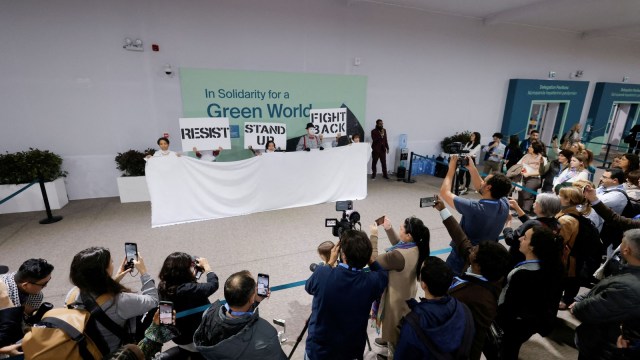Not much help from G20, COP29 gets back to resolving finance deadlock
The COP29 meeting here is trying to finalise a comprehensive agreement on climate finance to enable greater flows of money for climate action.
 People hold a protest and a performance against the restrictions climate CSOs have been facing at COP and around the world, during the United Nations Climate Change Conference (COP29), in Baku, Azerbaijan November 18, 2024. (Photo: REUTERS)
People hold a protest and a performance against the restrictions climate CSOs have been facing at COP and around the world, during the United Nations Climate Change Conference (COP29), in Baku, Azerbaijan November 18, 2024. (Photo: REUTERS)The ‘positive signals’ it was desperately seeking from the G20 summit in Brazil nowhere to be found in the G20 leaders’ declaration that came out Tuesday morning, the COP29 climate meeting got down to resolving the critical differences on finance negotiations on its own.
The host country’s chief negotiator Yalchin Rafiyev said a new draft text on the finance agreement, being called the New Cumulative Quantitative Goal on climate finance, or NCQG, would be prepared by Wednesday evening.
The COP29 meeting here is trying to finalise a comprehensive agreement on climate finance to enable greater flows of money for climate action. The negotiations, however, have been deadlocked for a week due to seemingly irreconcilable differences in the positions of countries over issues like the quantum of finance, the proportion of money to be raised through public finances, and crucially, who all should contribute.
COP29 delegates had been hoping that the leaders assembled in Rio de Janeiro for the G20 meeting — all key players representing different view points on climate finance negotiations — would offer some directions on resolving these issues.
“We cannot succeed without them, and the world is waiting to hear from them,” COP29 President Mukhtar Babayev had said on Monday.
“We urge them to use the G20 meeting to send a positive signal of their commitment to addressing the climate crisis. We want them to provide clear mandates to deliver at COP29,” he had said.
But the G20 declaration offered little in terms of resolving the differences. It did reiterate the need for rapidly scaling up climate finance “from billions to trillions”, something the G20 had acknowledged in its previous meeting in New Delhi last year as well, and promise to accelerate the reform of the international financial architecture to make more money available for climate change. But there was nothing to address the immediate COP29 need for some direction on resolving the deadlock on climate finance negotiations.
“We look forward to a successful New Collective Quantified Goal outcome in Baku. We pledge our support to the COP29 presidency and commit to successful negotiations in Baku,” was all that it said on the issue.
But even this was read as a positive signal by UN Climate Change chief Simon Stiell.
“G20 Leaders have sent a clear message to their negotiators at COP29: do not leave Baku without a successful new finance goal. This is in every country’s clear interests,” Stiell said.
Rafiyeh also appreciated the positive signal and said the negotiators at COP29 now needed to “translate the political will into practical work”
“Ministers from around the world have arrived in Baku to begin the final week of negotiations. On NCQG, we have defined how to proceed and we are already following that. This includes ministerial consultations on key political elements and working sessions for heads of delegations. We will have the first iteration of the full draft text of NCQG by tomorrow evening,” he said.
The G20 leaders made several other references to climate finance, but most of them were mere reiterations of stated positions. They promised to accelerate the reform of international financial system to make climate finance more affordable and accessible, and emphasised on the need for making finance flows consistent with the requirements of low-carbon development pathways.
“We are determined to lead bold, timely and structural actions in our national economies and in the international financial system with a view to accelerating and scaling up climate action… We underscore the need for increased international collaboration and support, including with a view to scaling up public and private climate finance and investment for developing countries,” the G20 declaration said.
“We will accelerate the reform of the international financial architecture so that it can meet the urgent challenge of sustainable development, climate change and efforts to eradicate poverty,” it said.
Meanwhile, the European Union was reported to have been discussing a figure of 200-300 billion dollars as the new annual climate finance amount that developed countries would mobilise every year. Developing countries have been demanding that at least 1.3 trillion dollars every year must be provided by the developed countries.
This new amount is supposed to replace the 100 billion dollar per year that developed countries had agreed to mobilise in the period 2020 to 2025 to help developing nations fight climate change. The Paris Agreement asks this amount to be significantly raise in the post-2025 period in view of the increased needs.
The developed nations have so far not put any figure on the table officially, but a couple of expert assessments in this past week have suggested that a commitment to at least triple the 100 billion figure, raised mainly through public finance, and largely in the form of grants or concessional loan
- 01
- 02
- 03
- 04
- 05






























